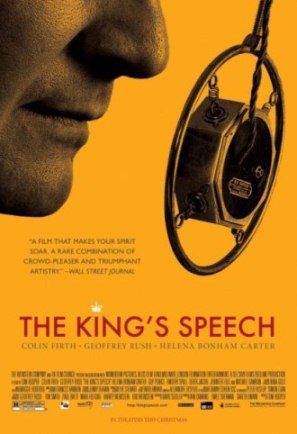
With the awards season here, I’m going to pick “The King’s Speech” as perhaps my favorite film of the year. Before seeing it, I thought it would be a bit dry and uneventful: a 1930’s period piece about the ascension of a king with a speech impediment to the throne of England. But it is anything but dull. The film, which dwells on the unlikely friendship of the Duke of York (later to become King George VI) and a speech therapist who helps him overcome his stammer, comes vibrantly to life on the big screen and is quite an extraordinary yarn.
The two are ill-matched, the duke and the commoner, whose credentials the duke finds out are not those of a real doctor. The destined monarch doesn’t believe in him, much less that he can be cured of something so ingrained. The therapist, played amazingly by Geoffrey Rush, has an uphill battle convincing the duke to accept him and in believing he can speak without a stammer.
Set against the backdrop of Edward VIII abdicating the throne and Hitler’s rise to power, the new king’s impediment coincides at a time of weighty importance. There’s no escaping his public speaking obligations. The film does a great job of conjuring the angst and imperativeness of his being able to communicate to the country. The king’s public address declaring war on Germany at the end is incredibly palpable, as is the film inspiring.
Kudos to the screenwriter, David Seidler, who apparently asked the royal family’s permission back in the 1970’s to write the script. The now-late Queen Elizabeth I (King George’s wife), however, declined saying the memory of events was too painful. Portraying the king as a stutterer apparently was not appropriate. Interestingly, it was Seidler’s own childhood stuttering that inspired him to write the script of his onetime idol and fellow stammerer, the king.
